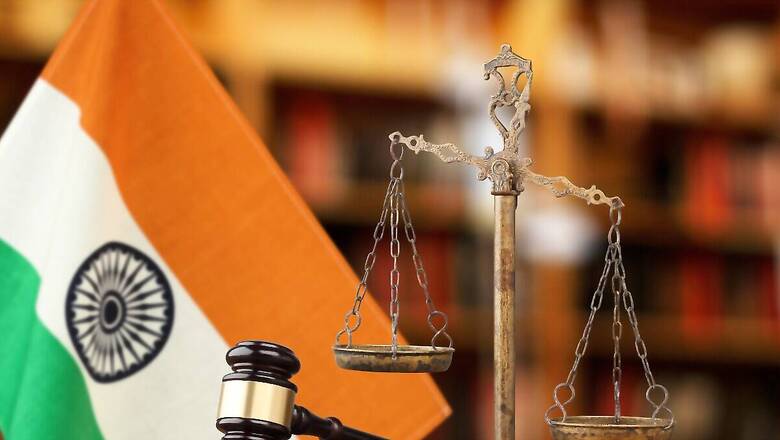
views
The primary and foremost objective of law is to establish equality among all people. Law is a sense of meaning in the naturally entropic world. It brings purpose, it institutes decisions, and it commences and regulates the system we have inhabited for ourselves.
History has perpetually been dictated by law – has often been decided by it. In a world where it is impossible to unequivocally know right from wrong, law brings us a semblance of certainty, a path to walking the fine line between just and unjust, without being shrouded by the dubiety of the grey. Law is all about the knowing, the salve of our unending quest for knowledge as humans.
Amidst the many aspects and kinds of cavernous law, civil law is the legal framework that places a community’s interpersonal relationships above criminal, military, or religious matters.
The elucidation of the Uniform Civil Code (UCC) in India has been a contentious and multifarious issue since the inception of the nation. It pertains to the aspiration of homogenizing personal laws governing various aspects of civil life, such as marriage, divorce, inheritance, and property, among others, across different religious communities.
This essay undertakes an exploration of the intricate discourse surrounding the implementation of UCC in India, scrutinizing its historical provenance, the constitutional framework, challenges posited by diversity, and the potential benefits it could accrue to Indian society.
The historical backdrop of the Uniform Civil Code debate in India finds its antecedents in the colonial era, when the British colonial administration endeavored to reform personal laws, particularly within the Hindu purview. The codification of Hindu personal laws gave rise to an escalating clamour for commensurate reform within other religious denominations.
Post-independence, the framers of the Indian Constitution were perspicacious in recognizing the pivotal significance of personal laws in the social tapestry of the nation. Consequently, the Indian state was urged by Article 44 of the Directive Principles of State Policy to make an earnest effort to promulgate a UCC as a means of achieving social justice and gender parity.
The former Portuguese colony of Goa and Daman kept its common family law system, known as the Goa civil code, making it the only Indian state to this day to have a consistent civil code.
The lauded Indian Constitution, with its democratic and secular leanings, supplies the fundamental skeleton for the discussion of a UCC. Although Article 44 is a directive principle, it does not peremptorily compel the state to create a UCC immediately and inexorably. Nevertheless, the apex judicial echelon of India, the Supreme Court, has, on several occasions, reasserted the imperative of a UCC in order to catalyse gender equitability, individual liberties, and the consolidation of national integration.
Foremost among the tribulations in the implementation of a UCC in India is the sheer expanse of diversity characterizing religious and cultural practices within the nation’s mosaic. India is a crucible of myriad religious assemblages, each adopting its own paradigm of personal laws deeply enmeshed in antiquated traditions.
This veritable diversity has spawned an unyielding resistance to the imposition of a uniform code, owing to apprehensions concerning the dilution of cultural and religious identities. The arduous task, therefore, is to orchestrate a harmonic symphony that skillfully combines the imperatives of a UCC with the demands of cultural sensibility.
The ingrained conventions that are codified in several personal laws present a concurrent issue. A paradigm change towards addressing gender disparities and the stain of gender discrimination, a phenomenon obdurately entrenched within extant personal laws, would be unavoidably required to implement a UCC. Potential resistance to the transformative process comes from traditionalist groups.
A Uniform Civil Code, if successfully circulated, bodes a cornucopia of salutary effects. First and foremost, it would usher in an era of egalitarianism wherein all citizens, regardless of their religious affiliations, would be ensconced in a realm of juridical uniformity. This pervasive uniformity is indubitably calculated to ennoble social concordance, thereby fostering an ambiance of amity and tranquility within the societal fabric.
Furthermore, a UCC would play a crucial role in eliminating gender-based injustices that are evident within the existing personal laws. It would act as a beacon, illuminating the path toward the enshrined principles of equity and justice venerated in the Constitution.
Thirdly, the instantiation of a UCC could engender the simplification of legal mechanisms, thus rendering them more accessible and perspicuous to the common citizenry. This would eventuate in the amelioration of legal intricacies and the mitigation of legal disputes, thereby bringing in a stage of legal coherence and efficacious adjudication.
In conclusion, the judicious pursuit of a Uniform Civil Code in India is a multifaceted and intricate endeavor, deeply ingrained within historical precedent and constitutional aspirations. The formidable challenges stemming from diversity and the concomitant resistance to transformative change are indisputable.
Nevertheless, the potential benefits in terms of the evident fruit in social harmony, gender parity, and legal discernment are equally compelling. The successful charting of a course that reconciles cultural heterogeneity with constitutional tenets is quintessential.
The implementation of a Uniform Civil Code in India could face numerous challenges and resistance from various sections of society, including religious groups, political parties, and cultural organizations. It is salient to carefully consider and address these concerns in order to ensure a smooth implementation of the Uniform Civil Code.
It is an imperative necessity for India to persevere in the perennial dialogue regarding the UCC, taking into cogent consideration the inexorable evolution of societal needs and aspirations. Only through thorough deliberation and circumspect decision-making can India aspire to achieve the delicate equilibrium prerequisite for the reality of a Uniform Civil Code that is symbolic of the verities of justice, parity, and inclusivity.
Aanya Thakur is a 14-year-old, Class 9 student of Dhirubhai Ambani International School. She is a voracious reader of varied genres and has a penchant for writing.




















Comments
0 comment